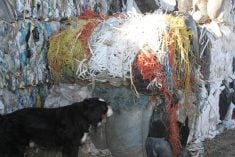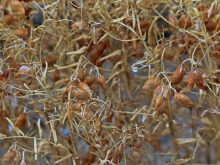A farm group’s efforts to rescue a federal government tree nursery have suffered a setback.
Federal agriculture minister Gerry Ritz is unimpressed with the business plan tabled by the Agricultural Producers Association of Saskatchewan to take over operations of the Agroforestry Development Centre in Indian Head, Sask.
The government announced in 2012 that it was shutting down the Prairie Shelterbelt Program and selling off the nursery to the private sector.
It provided a coalition led by APAS with $45,000 in funding to put to-gether a business plan for taking over the nursery.
Read Also

Alberta looks for agricultural plastic management input
Alberta provincial government giving agriculture industry a say through survey in shaping future plastics management
The group submitted a plan in September calling for the government to lease the facility to the coalition for two to three years and to provide $1.5 million in transition funding.
That didn’t sit well with the agriculture minister.
“I was disappointed that APAS used federal government money to put together a business plan that said the federal government should continue to keep paying,” said Ritz during a media scrum at a recent funding announcement for camelina breeding.
“We’re not going to do that. Publicly, I’ll reject that application. If they want to get serious, then so will I.”
APAS president Norm Hall said it was a serious proposal. The lease and transition funding requests were necessitated by the government’s rush to get rid of the asset by year’s end.
“We’re very disappointed with his reaction,” said Hall.
The coalition includes APAS, Keystone Agricultural Producers, the Alberta Federation of Agriculture, the Canadian Federation of Agriculture, British Columbia Grain Producers Association, the RM of Indian Head, the Town of Indian Head and the Peace River Regional District.
“We represent the folks that were planting the trees,” he said.
The group wanted to get together with the minister to discuss its plan but that won’t be happening.
“He won’t even entertain a meeting with us. He is supposedly too busy,” said Hall.
The coalition is now considering Plan B, which is to find other sources of funding to purchase the nursery.
“I don’t know if we’re going to get very far with that, but we have no choice now,” said Hall.
Ritz said there are eight other groups vying for the asset. He wants to see their business plans by this fall.
“We’d like to see something happen by the end of this calendar year so they could move forward with next spring,” he told reporters.
Hall said the Treasury Board of Canada Secretariat has a protocol that must be followed for the sale of government assets and he believes it would be impossible for Ritz to meet his own deadline while adhering to those rules.
Ritz has stated he wants the nursery to be sold as a going concern but Hall said the facility is already running on a skeleton staff, hasn’t sent out any order forms for the fall and is falling into a state of disrepair.
“We’re just hoping that there is a tree nursery there when it does end up being sold,” he said.
“It will just be a weedy field that they’re selling.”
Hall said some of the suitors for the property have no interest in keeping it as a tree nursery, which would be a shame.
















